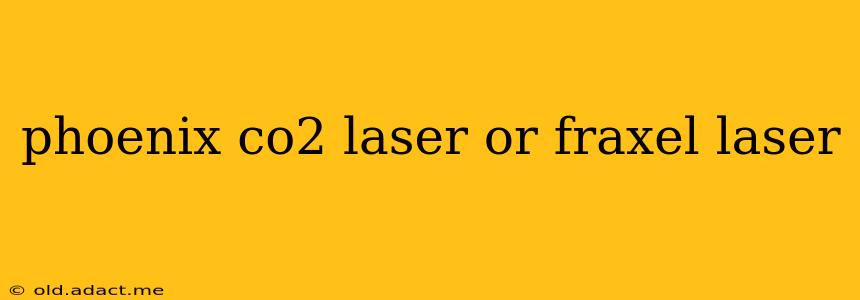Phoenix CO2 Laser vs. Fraxel Laser: Which Treatment is Right for You?
Choosing between a Phoenix CO2 laser and a Fraxel laser for skin rejuvenation can feel overwhelming. Both are effective at treating various skin concerns, but they differ significantly in their approach and outcomes. This comprehensive guide will delve into the specifics of each treatment, highlighting their advantages, disadvantages, and ideal applications to help you make an informed decision.
What is a Phoenix CO2 Laser?
The Phoenix CO2 laser is an ablative resurfacing laser. This means it removes the outer layers of skin to stimulate collagen production and improve skin texture. It's known for its ability to dramatically improve the appearance of wrinkles, scars (including acne scars), and sun damage. The "Phoenix" designation often refers to a specific type of CO2 laser technology known for its precise and controlled ablation. Because it's ablative, the recovery time is generally longer compared to non-ablative lasers.
What is a Fraxel Laser?
Fraxel lasers encompass a family of fractional lasers, both ablative and non-ablative. Unlike the Phoenix CO2 laser, which treats the entire surface area at once, Fraxel lasers treat only a fraction of the skin at a time. This microneedle approach allows for a more controlled and gentler treatment, leading to faster healing times. Non-ablative Fraxel lasers use heat to stimulate collagen, while ablative Fraxel lasers remove a small portion of skin to achieve similar results, but with varying degrees of downtime.
What are the benefits of a Phoenix CO2 Laser?
- Dramatic Results: Offers the most dramatic improvement in skin texture and tone compared to other resurfacing lasers.
- Effective for Severe Skin Damage: Ideal for deep wrinkles, severe acne scarring, and extensive sun damage.
- Long-lasting Results: Stimulates significant collagen production leading to long-term improvements.
What are the disadvantages of a Phoenix CO2 Laser?
- Significant Downtime: Expect several days to weeks of significant redness, swelling, and peeling.
- Higher Risk of Complications: Due to its ablative nature, there is a slightly higher risk of complications such as infection, hyperpigmentation, or hypopigmentation.
- Cost: Generally more expensive than Fraxel laser treatments.
What are the benefits of a Fraxel Laser?
- Minimal Downtime: Depending on the type of Fraxel laser used (ablative or non-ablative), downtime can range from minimal to moderate.
- Less Painful: Typically less painful than a full CO2 laser treatment.
- Suitable for Various Skin Types: Can be adapted for different skin types and tones.
- Gradual Improvement: Provides gradual improvement over multiple sessions, making it less disruptive to daily life.
What are the disadvantages of a Fraxel Laser?
- Multiple Treatments Needed: Often requires multiple sessions to achieve desired results.
- Less Dramatic Results (Non-Ablative): Non-ablative Fraxel treatments deliver less dramatic results than ablative Fraxel or CO2 lasers.
- Cost: While less expensive per session than CO2, multiple sessions can increase the overall cost.
Which treatment is better for acne scars?
Both can treat acne scars, but the best choice depends on the severity. Severe acne scars often respond better to a Phoenix CO2 laser's more aggressive resurfacing, while milder acne scars can be effectively treated with a Fraxel laser, potentially requiring fewer treatment sessions.
Which treatment has a shorter recovery time?
Fraxel laser treatments, particularly the non-ablative type, generally have a much shorter recovery time compared to the Phoenix CO2 laser. The CO2 laser results in more significant downtime due to its ablative nature.
Which treatment is better for wrinkles?
Both treatments can effectively reduce wrinkles, but again, severity matters. Deep wrinkles often respond better to the Phoenix CO2 laser's deeper penetration and collagen stimulation, while milder wrinkles can benefit from Fraxel laser treatments.
Which treatment is right for me?
The best treatment for you depends on individual factors like your skin type, the severity of your skin concerns, your desired outcome, and your tolerance for downtime. A consultation with a qualified dermatologist or cosmetic surgeon is crucial to determine the most appropriate treatment plan. They will assess your skin, discuss your goals, and help you choose the best option to achieve optimal results while minimizing risks. Don't hesitate to ask questions and clarify any uncertainties before proceeding with any laser treatment. Remember that individual results may vary.
